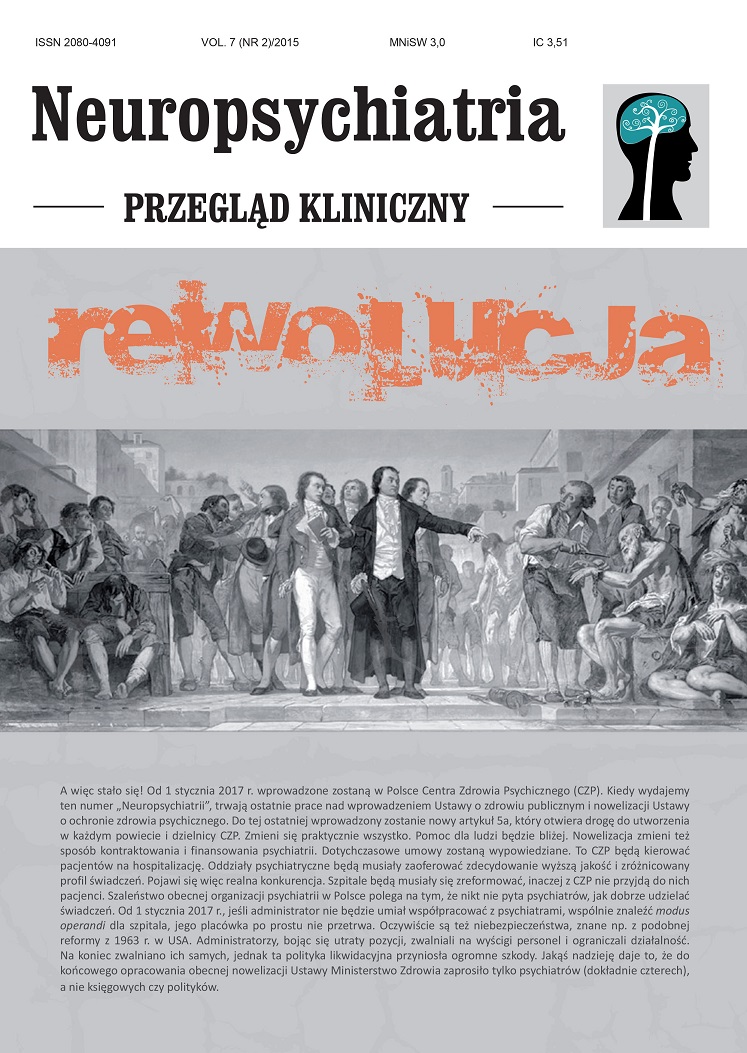Physiotherapy in psychiatric treatment Review article
Main Article Content
Abstract
Physiotherapy is a method used successfully in various fields of medicine. Physiotherapy due to the substantial therapeutic potential should be taken into account also in the process of treating patients with mental disorders.
Article Details
Issue
Section
Articles

This work is licensed under a Creative Commons Attribution-NonCommercial-NoDerivatives 4.0 International License.
Copyright: © Medical Education sp. z o.o. License allowing third parties to copy and redistribute the material in any medium or format and to remix, transform, and build upon the material, provided the original work is properly cited and states its license.
Address reprint requests to: Medical Education, Marcin Kuźma (marcin.kuzma@mededu.pl)
References
1. Aleszko Z. Terapia poprzez ruch, taniec, sport. W: Wciórka J, Pużyński S, Rybakowski J (red.). Psychiatria. Tom 3. Wyd. III. Wydawnictwo Elsevier Urban & Partner, Wrocław 2012: 376-380.
2. Bernardi C, Tramontina A, Nardin P et al. Treadmill exercise induces hippocampal astroglial alterations in rats. Neural Plasticity 2013; 2013: 709732.
3. Bechara R, Kelly A. Exercise improves object recognition memory and induces BDNF expression and cell proliferation in cognitively enriched rats. Behavioral Brain Research 2013; 245: 96-100.
4. Dhikav V, Anad KS. Atypical antidepressive mechanisms: glutamatergic modulation and neuroplascity in case of tianeptine. Is hippocampal atrophy a future drug target? Medical Hypotheses 2007; 68(6): 1300-1306.
5. McEven BS, Chattarji S. Molecular mechanism of neuroplasticity and pharmacological implications: the example of tianeptine. European Neuropsychopharmacology 2004; 14(supl. 5): 497-502.
6. Nowakowska E, Kus K, Ratajczak P et al. The influence of aripiprazole, olanzapine and enriched environment on depressant-like behavior, spatial memory dysfunction and hippocampal level of BDNF in prenatally stressed rats. Pharmacological Reports 2014; 66(3): 404-411.
7. Challagan P. Exercise: a neglected intervention in mental health care? Journal of Psychiatric Mental Health Nursing 2004; 11: 476-483.
8. Acil AA, Dogan S, Dogan O. The effects of physical exercise to mental state and quality of life in patients with schizophrenia. Journal of Psychiatric and Mental Health Nursing 2008; 15: 808-815.
9. Scheewe T, van Haren N, Sarkisyan G et al. Exercise therapy, cardiorespiratory fitness and their effect on brain volumes: a randomised controlled trial in patients with schizophrenia and healthy controls. European Neuropsychopharmacology 2013; 23(7): 675-685.
10. Krogh J, Speyer H, Nørgaard H et al. Can exercise increase fitness and reduce weight in patients with schizophrenia and depression? Frontiers in Psychiatry 2014; 5: article 89.
11. Rethorst C, Wipfli B, Landers D. The antidepressive effects of exercise. Sports Medicine 2009; 39(6): 491-511.
12. Krogh J, Nordentroft M, Mohammad-Nezhad M, Westrin A. Growth hormone, prolactin and cortisol response to exercise in patients with depression. Journal of Affective Disorders 2010; 125: 189-197.
13. Cooney G, Dwan K, Mead G. Exercise for depression. JAMA 2014; 311(23): 2432-2433.
14. Josefsson T, Lindwall M, Archer T. Physical exercise intervention in depressive disorders: Meta-analysis and systematic review. Scandinavian Journal of Medicine & Science in Sports 2014; 24: 259-272.
15. Machado G, Ferreira M. Physiotherapy improves eating disorders and quality of life in bulimia and anorexia nervosa. British Journal of Sports Medicine 2014; 48(20): 1519-1520.
2. Bernardi C, Tramontina A, Nardin P et al. Treadmill exercise induces hippocampal astroglial alterations in rats. Neural Plasticity 2013; 2013: 709732.
3. Bechara R, Kelly A. Exercise improves object recognition memory and induces BDNF expression and cell proliferation in cognitively enriched rats. Behavioral Brain Research 2013; 245: 96-100.
4. Dhikav V, Anad KS. Atypical antidepressive mechanisms: glutamatergic modulation and neuroplascity in case of tianeptine. Is hippocampal atrophy a future drug target? Medical Hypotheses 2007; 68(6): 1300-1306.
5. McEven BS, Chattarji S. Molecular mechanism of neuroplasticity and pharmacological implications: the example of tianeptine. European Neuropsychopharmacology 2004; 14(supl. 5): 497-502.
6. Nowakowska E, Kus K, Ratajczak P et al. The influence of aripiprazole, olanzapine and enriched environment on depressant-like behavior, spatial memory dysfunction and hippocampal level of BDNF in prenatally stressed rats. Pharmacological Reports 2014; 66(3): 404-411.
7. Challagan P. Exercise: a neglected intervention in mental health care? Journal of Psychiatric Mental Health Nursing 2004; 11: 476-483.
8. Acil AA, Dogan S, Dogan O. The effects of physical exercise to mental state and quality of life in patients with schizophrenia. Journal of Psychiatric and Mental Health Nursing 2008; 15: 808-815.
9. Scheewe T, van Haren N, Sarkisyan G et al. Exercise therapy, cardiorespiratory fitness and their effect on brain volumes: a randomised controlled trial in patients with schizophrenia and healthy controls. European Neuropsychopharmacology 2013; 23(7): 675-685.
10. Krogh J, Speyer H, Nørgaard H et al. Can exercise increase fitness and reduce weight in patients with schizophrenia and depression? Frontiers in Psychiatry 2014; 5: article 89.
11. Rethorst C, Wipfli B, Landers D. The antidepressive effects of exercise. Sports Medicine 2009; 39(6): 491-511.
12. Krogh J, Nordentroft M, Mohammad-Nezhad M, Westrin A. Growth hormone, prolactin and cortisol response to exercise in patients with depression. Journal of Affective Disorders 2010; 125: 189-197.
13. Cooney G, Dwan K, Mead G. Exercise for depression. JAMA 2014; 311(23): 2432-2433.
14. Josefsson T, Lindwall M, Archer T. Physical exercise intervention in depressive disorders: Meta-analysis and systematic review. Scandinavian Journal of Medicine & Science in Sports 2014; 24: 259-272.
15. Machado G, Ferreira M. Physiotherapy improves eating disorders and quality of life in bulimia and anorexia nervosa. British Journal of Sports Medicine 2014; 48(20): 1519-1520.

